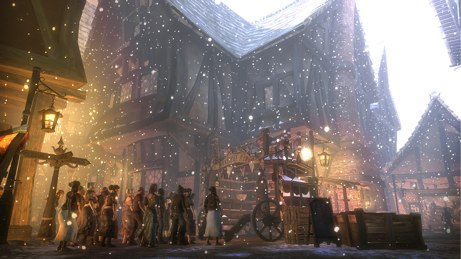On Immersiveness and Fable 2
There’s a few things to dislike about the game. One’s first impression is that it has been cripplingly casualized. You follow a glowing trail to where you need to go, and mash a button to fight. The setting is more or less standard ye olde RPG fantasie lande. The expression system – instead of talking, your mute character interacts with others via a radial menu of ‘expressions’ including ‘slap’, ‘whistle’, ‘fart’, ‘sock puppet’ – is corny as fuck. And then pick any number of minor frustrations, like long loading times, laggy and clumsy menus, the confusing map (or lack of map), and serious bugs like vanishing NPCs, empty stores, and even wholesale freezing and game save corruption.
But here’s the rub, and OK, I can’t resist a Fallout comparison here. Fallout 3 is a game in which you can do anything you want, as long as what you want to do is crawl through dungeons and shoot cockroaches. Fable 2 is a game where you can do any number of things. Time to pray to the god of the unordered list – you can
- stick to the main story quests – just go around and fight things
- take on any number of side quests, which tend to be quite well developed
- become a blacksmith
- buy up property
- get married
- cheat on your spouse
- become a bartender
- play a number of pub games
- run around searching for hidden treasures
- trade goods
This is to say nothing of the things that you can do that have no benefit to your character, the sandboxy moments that are too numerous to list. In total, the things you can do are limited, and the complexity of each of the things is also limited, but the developers have found the ideal cocktail – it’s enough depth and complexity that the world becomes almost completely immersive in a way that sheer graphics can never provide.

For example, the simple button mashing of early combat becomes more interesting as you level up. You have three main attributes: strength, skill (dexterity) and will (magic). Combat, items and other phenomena will earn you experience in these specific attributes (using a lot of spells gives you magic experience), but also earns general experience that can be spent on any of the three. With your experience, you ‘buy’ increasing complexity, so strength improvements are be to attack damage, hit points, and a number of new melee techniques – the ability to block, then the ability to charge up a power attack, then the ability to counter an attack. Level up skill, and you will get faster, more accurate with your bow, and eventually you’ll be able to zoom and target specific body parts. With will, you have about seven different spell types, each with five levels of advancement. So what seems like button mashing eventually gives way to a system with a great number of tactical options. I settled on a system of summoning monsters to keep my enemies busy, while I attacked from afar, either with bow/gun or magic attacks.
Similarly, the corniness of the expressions hides a communications system that in many ways surpasses those usually found in RPGs. Despite innovations like the dialogue wheels of Mass Effect or Indigo Prophecy, RPG conversations are basically menus of text options. Fable’s expressions are more or less the same, but they move the dynamics of the conversation out of the realm of text and into your character’s physical actions – which is to say back into the game space, which is a Good Thing. There is a lot of depth, too, seeing as you can interact with any character in the game, and each has different personality characteristics which will affect their reaction to your character’s traits (good/evil, pure/corrupt, famous/not famous, good looking/ugly) and your expression choices (which are numerous). Sometimes this leads to hilarity, like when a character is terrified and also crazily sexually attracted to you – they might say, “how dare you massacre all those people. Let’s go back to my place and get to know each other better.”

There’s something interesting in all this, which is that it’s not necessarily realism that makes something immersive. Immersion may have more to do with a lack of things that take you out of the world. Every time in Fable that you imagine ‘what would happen if I do this,’ you get a result that stays true to the world. Take out your sword in the town square, and people will like you less. Remove bandits from a town’s environs, and real estate values will go up. This of course assumes a certain level of complexity for it to work, but more specifically it’s a bunch of game mechanics (combat, expression, economy, job, family, etc.) that each fall far, far short of being realistic, but all add up to something that at least feels like the diversity of action possible in the real world.
If you’re into “Big World” games, this is one you need to have a look at.